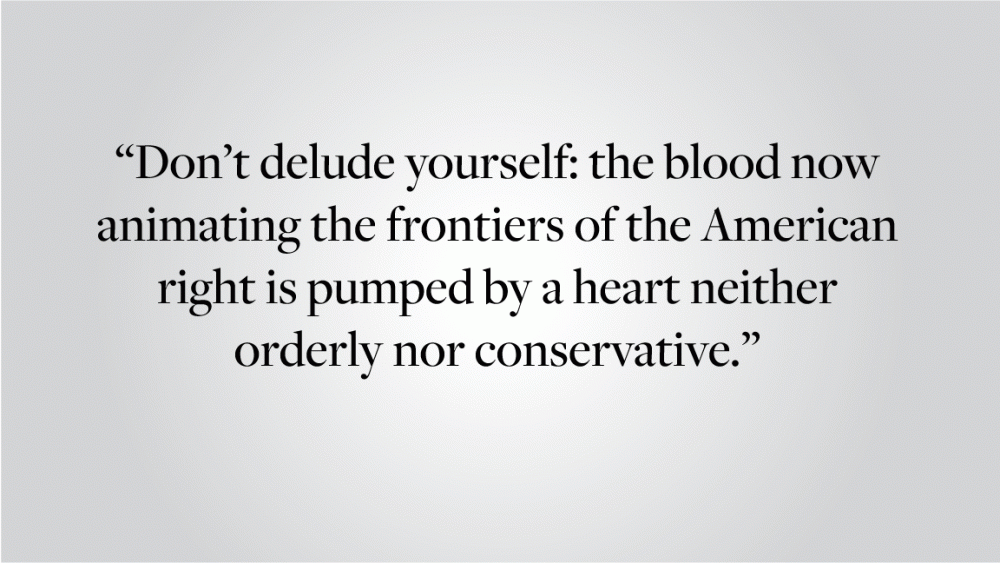In his 1968 book “Miami and the Siege of Chicago,” novelist-slash-journalist Norman Mailer offered the following characterization of the rank-and-file Nixon supporters he saw at that year’s Republican National Convention in Miami:
A “principal of a small town high school, local lawyer, retired doctor, a widow on tidy income, her minister and fellow-delegate, minor executives from minor corporations … — the stable and the established, the middle-aged and the old, a sprinkling of the young, the small towns and the quiet respectable cities of the Midwest and the Far West and the border states were out to pay their homage to their own true candidate, the representative of their conservative orderly heart.”
The passage, exhaustive though it may be, evokes something crucial about the Republican Party at the time. It was the party of the staid and structured, those who wanted things to run smoothly largely the way they were without disruption. That was no inherent virtue — the disruptions they wished to avoid would have included things like anti-war protests and integration efforts — but it was a defining trait of the era’s Republican Party. Now it’s hard to see any remnant of that party in today’s GOP, especially in the viking-horned, Q-flag-waving, frenzied mob that stormed the Capitol on Jan. 6.
There are still a few in the Republican Party that can’t help but recall the “congregation of the clean, the brisk, the orderly, the efficient” that Mailer saw in Miami. Representative Peter Meijer of Michigan, the clean-cut scion of a Midwest superstore chain, justified his trip to observe the U.S. withdrawal from Afghanistan by stressing how it helped him learn about what was necessary “to make sure things run smoothly” and address a situation that was “incredibly chaotic” — sounding so much like a respectable functionary from Mailer’s Miami. Northeastern Republican governors like Maryland’s Larry Hogan, Vermont’s Phil Scott, New Hampshire’s Chris Sununu or Massachusetts’ Charlie Baker also fit the mold, serving as reserved checks on the ambitions of their deep-blue state legislatures. But these exceptions are exactly that, exceptions far from the Republican mainstream and even further from the party’s most energetic forces. After Meijer voted to impeach former President Trump, he quickly found himself faced with a primary challenger. Those blue-state Republican governors are often not all that popular with Republicans in their states; they frequently have higher approval ratings among Democrats than Republicans.
Gone are the days of the Republican heart being, as Mailer wrote more than fifty years ago, “conservative (and) orderly.” To begin with the latter adjective, many in the Republican camp strain to be described as anything approaching “orderly.” Attend a Trump rally today and you will not find the punctilious middling professionals Mailer saw in Miami, but ostentatiously misogynistic shirts, Trump-honoring elephants and Lil Pump endorsements. The ineluctable example is the chaos of Jan. 6’s insurrection, the absolute opposite of standing for the orderly workings of an orderly nation.
Mailer’s other descriptor of the GOP’s heart was “conservative” and this too rings hollow today. What do the energies on the frontlines of the Republican Party wish to conserve? William F. Buckley, godfather of American conservatism, famously founded his magazine National Review to “stand athwart history, yelling Stop.” No one in the Republican Party seems as if they’d be very happy if history stopped and things just stayed as they are today. Nor does the GOP base even seem to wish to return to some identifiable, idyllic time when America truly was great. The Reagan presidency, which that slogan harkens back to, for example, was rather sympathetic to immigrants, today surely a cardinal sin for those in the Trump orbit. If the Reagan era was too inclusive for them, earlier eras in American history don’t seem like they’d be that compelling either; unlike mid-century conservatives, modern Republicans by and large don’t advocate for rolling back the New Deal. If conservatism means putting on the brakes on society, or even shifting it into reverse, I would struggle to call the modern Republican Party conservative. If anything, they wish to wrest the wheel away from whoever’s driving (Democrats, the liberal elite, the deep state, lizard people perhaps) and jerk the wheel in an entirely different direction.
That direction is unclear. Some wish to double-down on the spittle-flecked populism that Trump never could or never would turn into real policy. Senator Tom Cotton introduced a bill unsubtly titled the Ivory Tower Tax Act to fund vocational training programs by taxing the most elite colleges, those that are busy “indoctrinating our youth with un-American ideas.” In Florida, Gov. Ron DeSantis is taking another path: His lax COVID-19 response promotes a libertarian society devoid of obligations to fellow citizens and where one need think only of oneself, a series of policies that has led James Hohmann to pronounce in the Washington Post that “Florida Gov. Ron DeSantis (R) is no conservative.” In some recesses of the American right, one can find something resembling a willingness to overthrow the whole system of liberal democracy. Conservative intellectual Sohrab Ahmari’s no-holds-barred approach to the culture wars, advocating for a more active government role in social issues, has led even conservative columnist Bret Stephens to label him “something of a new illiberal.” This finds a less intellectual parallel in those on the American right’s fringes who have shown a concerning sympathy for the hyper-masculine, nationalist and theocratic Taliban’s defeat of a liberal democracy. These various strands all share one thing in common: They hold little trace of the party that Mailer saw in 1968. Clinging to that understanding of the Republican Party is what left much of the nation, myself included, dumbfounded on Jan. 6. Don’t delude yourself: The blood now animating the frontiers of the American right is pumped by a heart neither orderly nor conservative.
ADVERTISEMENT
Augustus Bayard
Augustus Bayard was the senior editor of opinions for The Brown Daily Herald's 133rd Editorial Board.





